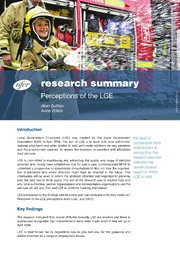Table Of Contentresearch summary
p
Perceptions of the LGE u
o
Gr
n
o
z
ori
Jean Sutton H
us
c
Anne Wilkin mi
A
Introduction
Local Government Employers (LGE) was created by the Local Government the level of
Association (LGA) in April 2006. The aim of LGE is to work with local authorities, cooperation from
regional employers and other bodies to lead and create solutions on pay, pensions
stakeholders in
and the employment contract, to ensure the provision of excellent and affordable
conducting this
localservices.
research exercise
LGE is committed to maintaining and enhancing the quality and range of services
reflected the
providedand,havingbeenestablishednowforoverayear,commissionedNFERto
overall positive
undertake a programme of stakeholder consultations to find out how the organisa-
tion is perceived and where attention might best be directed in the future. This regard in which
information will be used to inform the strategic direction and organisation planning LGE is held
over the next two to three years. The aim of the research was to explore how and
whylocalauthorities,partnerorganisationsandrepresentativeorganisationsusethe
servicesofLGEandhowwellLGEiscurrentlymeetingtheirneeds.
LGE’sresponsetothefindingsanditsactionplancanbefoundinDotheymeanus?
ResponsetotheLGEperceptionsaudit(LGE,July2007).
Key findings
The research indicated that overall attitudes towards LGE are positive and there is
widespread recognition that improvements have been made since it was set up in
April2006.
LGE is best known for its negotiating role on pay and also for the guidance and
adviceprovidedonarangeofemploymentissues.
There are varying levels of interaction with LGE, ranging from a passive receipt of
documentationthatissent,toactivesolicitingofadviceand/orinvolvementinwork-
ing groups and committees. The variation in levels of engagement is due to a
numberoffactorsincluding:
• varyinglevelsofunderstandingastothefocusorremitofLGE
• lackofclarityregardingtheserviceofferedbyLGE
• confusionbetweentheroleofLGEandtheregionalemployerorganisations
• lack of understanding of the division of responsibility between LGE and the
ImprovementandDevelopmentAgency(IDeA)
• differencesinresourcesand/orsupportavailableinternallywithincouncils.
For many local authorities, their expectation of LGE was that it would continue the
work previously done by the Employers Organisation. Respondents are typically
grateful to have had continuity, and in many cases, what is perceived to be
improvement.
The strong leadership that has been in place at LGE since 2006 is welcomed, and
efforts to consult, communicate and engage have been welcomed. Respondents
would,however,welcomegreaterconsultationandinvolvementwithLGE,andcon-
cernwasexpressedthatthoseoutsideofLondonshouldnotbemarginalised.
Whileitisrecognisedthatitisstill‘earlydays’,thereissomedebateabouttheroleof
LGE in relation to ‘single status’ and perhaps an expectation that LGE might play a
strongerroleofferingmoredirection.
Unsurprisingly,stakeholderorganisationsrepresentingemployeessaythatLGErep-
resentsemployerinterestsbutarenonethelesspositiveintheircommentsonLGE.
WhenmakingsuggestionsrelatingtofutureactionbyLGE,therewasconsistencyin
the underlying themes of a need for greater visibility, clarification of role, increased
engagementanddialogue,andpotentiallydeliveringstrongerguidanceanddirection.
Conclusions and recommendations
The level of cooperation from stakeholders in conducting this research exercise
reflected the overall positive regard in which LGE is held. While some of the issues
arisingindiscussionsarespecifictotheindividualrespondentorganisation,andper-
ceptions of the role of LGE are somewhat variable, a consistent pattern did arise in
terms of attitudes towards LGE, expectations in terms of future development and
suggestionsforimprovement.
The research indicated that while the overall perception of LGE is a positive one,
there are certain areas where improvement would lead to an enhanced profile and
resultinmorepositiveattitudestowardstheorganisation.
A clarification of the range of activities and services offered by LGE would ensure
that there is an appreciation of the wider spheres of activity beyond the negotiating
andadvisoryroleswithwhichtheorganisationismostoftenassociated.
While it is the prerogative of each stakeholder to engage with LGE to a greater or
lesserextentaccordingtotheirneeds,improvedcommunicationandthebuildingof
closer relationships would encourage more pro-active involvement and make it less
likelythatparticipantssuchaslocalauthoritieswouldquestiontheroleofthecentral
organisation,andensurethattheyfeeltheirneedscanalsobemetbytheirregional
employer’sorganisation.
cil
n
u
o
C
n
a
g
Wi
The national role of LGE is clearly one of the distinguishing features and so empha-
sisshouldbeplacedonthisaspect.Futurecommunicationsshouldclarifytheroleof
LGE vis-à-vis the regional employer organisations while particular efforts must be
made to solicit participation and involvement of local authorities across all regions.
Therecentlyestablishedsoundingboardwillcontributetothisaim.
LocalauthoritiesandstakeholdersalikestruggletodelineatetheroleofLGEfrom
IDeA – or even in some cases from LGA. Typical questions include: Is a lobbying
role within the remit of LGE? What should be expected of LGE or referred to
IDeA? This confusion detracts from the strength of identity for LGE when con-
stituents are unclear as to the role. Some clarification is necessary in this regard.
The research indicates that a general review of communications would be benefi- LGE is best
cial, in terms of the key messages, the vehicles or channels for communication
known for its
and also in terms of the target audience. Experience at present is somewhat
negotiating role
patchy and it is not evident that material is reaching those for whom it is intend-
on pay and also
ed. A cohesive policy should be developed for all parts of the organisation.
for the guidance
The website is a natural port of call for information relating to LGE and feedback
and advice
was mainly positive about this. However, a number of suggestions were made
provided on a
regarding the type of content expected and so a review of potential improve-
ments would ensure that the website continues to play an important role in range of
information dissemination. employment
issues
Therearediscerniblebenefitstobegainedinparticipation,supportandpositiveper-
ceptions where there has been some direct/personal contact with senior staff from
LGE. Thus, efforts to consult, communicate and engage should be continued.
Emphasis should be placed on development of contacts within local authorities in
particularbutalsoamongallstakeholders.ThereisscopetoraisetheprofileofLGE
amongstakeholderorganisationsthatmaybefamiliarwithonlyaspecificpartofthe
organisation,suchasprovidingtheSecretariatforallJointNegotiatingGroups.Even
thoughmanyoftheservicesarenotdirectedatthewholerangeofourstakeholders,
awarenessofthebreadthofservicesofferedbyLGEwillenhancethewayinwhichit
is viewed. This will, in turn, lead to a strengthening of perceptions of the role and
supportprovidedtolocalauthoritiesandoftheexpertiseheldbyLGE.
LondonBoroughofBrent
The overriding conclusion from the research is the need to raise the profile of the
organisationoverall.Thiswasacommonthemeeithermentionedexplicitlyorallud-
edtobythemajorityofrespondents.Actiononthiswouldservetoclarifytherange
ofservicesoffered,reduceconfusionregardingtheroleoftheorganisationinrelation
to others and ensure that LGE is receiving recognition and credit for its many
achievements.
About the study
The main fieldwork consisted of in-depth telephone interviews with 15 human
resources directors in local authorities together with 17 from stakeholder organisa-
tions. The local authorities interviewed were balanced by region and by political
affiliation.Thestakeholdersincludedbothpartnerorganisationssuchasotherregional
employer organisations or government departments and representative organisations
suchastradeunionsandothersrepresentingtheinterestsofemployees.Theresearch
wasconductedduringApril2007.
Forfurtherdetailsaboutthisresearchproject,pleasecontact:
AnneWilkin
[email protected]
01904433435
KentCountyCouncil
pay,pensions
and
employment
solutions
Thisprojectwasfundedbythe
LocalGovernmentEducation
andChildren’sServices
ResearchProgramme
NationalFoundationfor
EducationalResearch
TheMere,UptonPark
Slough,BerkshireSL12DQ
tel:+44(0)1753574123
fax:+44(0)1753691632
email:[email protected]
web:www.nfer.ac.uk
©NFER2007
WestminsterCityCouncil

